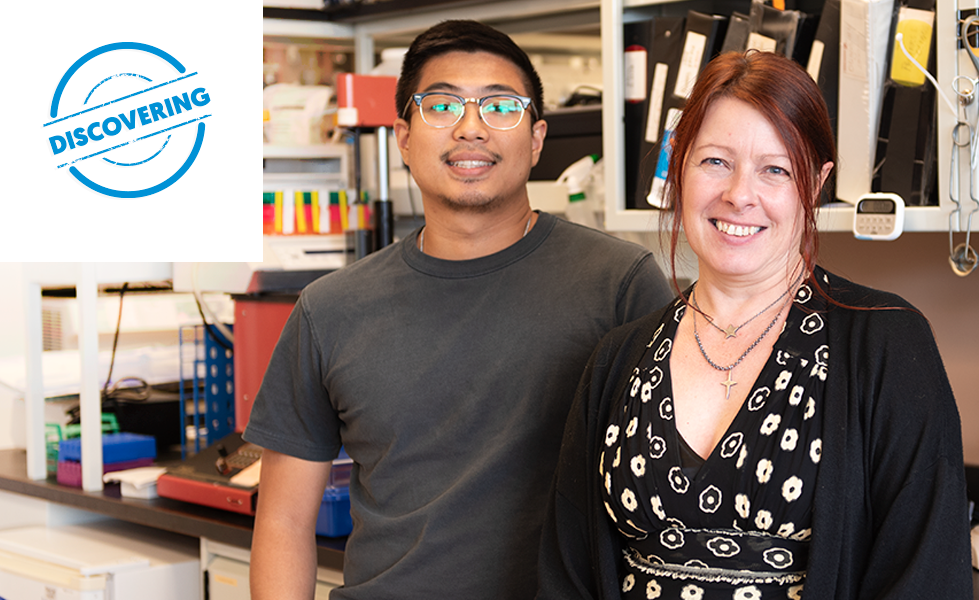
From left to right: 'Sonny' Pudchalaluck Panichnantakul et Dre Marlene Oeffinger
Work by the team of Dr. Marlene Oeffinger, Director of the Ribonucleoprotein Biochemistry Research Unit at the Montreal Clinical Research Institute (IRCM) and Associate Research Professor in the Department of Biochemistry and Molecular Medicine at the Université de Montréal, recently published in Cell Reports, identifies the fundamental role of a little-know posttranslational protein modification, UFMylation, in the repair of damaged ribosomal DNA in human cells.
Ribosomal DNA - Essential for Protein Production
The ribosomal (r)DNA gene encodes the large RNA molecule that forms the ribosome, the essential biological machine that produces the cell’s proteins. As cells need many ribosomes, the human genome contains ~300 clustered copies of the rDNA gene located in the nucleoli, phase-separated regions in the nucleus.
Their repetitive sequences and constant use make rDNA genes particularly susceptible to genotoxic damage, and insufficient repair of ribosomal DNA has profound effects on the human body. Loss or mutation of rDNA copies and abnormal increases and decreases in ribosome production affect organ development, and as the rDNA genes are among the most rearranged regions in human cancer genomes, promoting their repair could be a good therapeutic strategy. Currently, our understanding of the mechanisms that regulate the repair of damaged ribosomal DNA - or safeguard its copy numbers- remains extremely limited, hampering any development of potential therapies to maintain rDNA to prevent carcinogenesis-linked recombination events.
The work carried out by doctoral student ‘Sonny’ Panichnantakul, in Marlene Oeffinger’s laboratory, showed that the posttranslational protein modifier UFM1 regulates early steps of ribosomal DNA repair, and its loss significantly sensitizes cells to rDNA damage.
“We have known the steps necessary to repair rDNA for some time, which are different from nuclear DNA repair, but we did not know how they are initiated or coordinated,” explains Dr. Marlene Oeffinger. “This finally provides new avenues for targeting the individual steps and explore their mechanisms.”
In Depth
When rDNA is damaged, it is transcriptionally silenced to avoid generating defective ribosomes, and the nucleolus reorganizes to move the damaged section away from active rDNA sites to prevent recombination events. The regions containing damaged rDNA – called ‘nucleolar caps’ – also serve as repair hubs to which repair proteins have to be recruited at the right time. However, how these events are initiated and coordinated is yet to be fully uncovered.
Dr. Marlene Oeffinger’s team has demonstrated, for the first time, that UFMylation – a pathway that targets and modifies proteins with the Ubiquitin-like modifier protein UFM1 – is essential for ribosomal DNA repair in human cells and has identified UFMylated proteins involved in the process, including repair and nuclear actin cytoskeleton proteins. Like an activation signal and guidance beacon, marking these proteins with UFM1 is required for crucial steps of rDNA repair, including silencing and corralling of damaged rDNA and activation of downstream signalling proteins to initiate efficient repairs.
Acknowledgements
This study was conducted by the PhD student ‘Sonny’ Pudchalaluck Panichnantakul, with the contributions of students Mackenzie Guest and Evan Daynard, research associate Carolina Aguilar, and collaborators Colton Peters and Dr. Jackie Vogel from McGill University. The study was funded by the Cancer Research Society, Natural Sciences and Engineering Research Council of Canada (NSERC), and the Canadian Institutes for Health Research (CIHR). ‘Sonny’ Pudchalaluck Panichnantakul was a recipient of a CIHR Doctoral Research Scholarship during the study.




